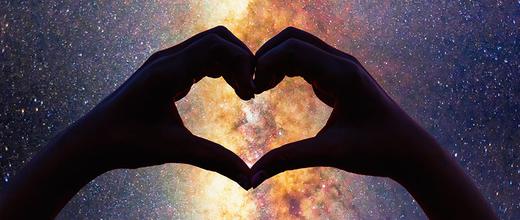The views expressed in our content reflect individual perspectives and do not represent the authoritative views of the Baha'i Faith.
Today we live in an age when materialism prevails over so much that past ages held as foundational.
Atheists like Richard Dawkins and his compatriots portray religion as belonging to the past; backward, irrational and dangerous, with no connection to reality, a belief reinforced by widespread fundamentalist attitudes. But other stories about our existence and origins have recently developed that challenge previous understandings.
Big History is a digitally-delivered history of the Universe from the ’Big Bang’ to the present; an origin story like many others but, instead of being rooted in a specific culture or geography, Big History aims to account for everything we know and that which we have yet to discover. Contributors include philosophers, scientists, scholars, adventurers, and curious learners of all kinds who weave the over-arching story of our development. Using a multidisciplinary approach, Big History combines cosmology, natural history and a deep study of the long time frames of the known universe, exploring existence in the context of a larger and more inclusive picture. Big History, in other words, takes a new look at the human origin story.
Perhaps Joni Mitchell sang the most appealing origin story at Woodstock: “We are stardust, we are golden, and we got to get ourselves back to the garden.”
Baha’u’llah, the prophet and founder of the Baha’i Faith, put it this way:
O Children of Men! Know ye not why We created you all from the same dust? That no one should exalt himself over the other. Ponder at all times in your hearts how ye were created. Since We have created you all from one same substance it is incumbent on you to be even as one soul, to walk with the same feet, eat with the same mouth and dwell in the same land, that from your inmost being, by your deeds and actions, the signs of oneness and the essence of detachment may be made manifest. Such is My counsel to you, O concourse of light! Heed ye this counsel that ye may obtain the fruit of holiness from the tree of wondrous glory. – The Hidden Words, p. 20.
Scientists have found that everything, including the planet and ourselves, is indeed made from stardust, as further endorsed in the Bible:
And the Lord God formed man of the dust of the ground, and breathed into his nostrils the breath of life; and man became a living soul. – Genesis 2:7.
Stardust sounds fantastical, but is actually a scientific term that refers to the refractory dust grains condensed from cooling ejected gases in the universe. Stardust made up the cloud from which our solar system originally condensed—it literally created the Earth and its inhabitants.
When we take a “Big History” approach, we can see that earthly life evolved from all that stardust. With the evidence provided by DNA, we can see that we are all—every plant and animal and human—evolved from L.U.C.A.; which stands for the “Last Universal Common Ancestor,” a single-celled organism that lived four billion years ago.
But when did religion develop? No one knows, but the oldest building ever discovered on Earth, Turkey’s Gobekli Tepe—a temple predating Stonehenge by 6000 years—was built 10,000 years ago in the Neolithic period, by people we would typically term primitive. That remarkable temple, and its obvious implications for human history, has inspired the statement “Civilization Begins with Religion”—because it presents a total change from the previous theory that religion developed after civilization did, when hunter-gatherers settled in cities and social tensions began to develop.
In this conceptual framework, religion forms civilization—not the other way around. The Baha’i teachings embrace this ancient principle:
A Greek philosopher [Galen] living in the days of the youth of Christianity, being full of the Christian element, though not a professing Christian, wrote thus: “It is my belief that religion is the very foundation of true civilization.” For, unless the moral character of a nation is educated, as well as its brain and its talents, civilization has no sure basis.
As religion inculcates morality, it is therefore the truest philosophy, and on it is built the only lasting civilization. As an example of this, he points out the Christians of the time whose morality was on a very high level. The belief of this philosopher conforms to the truth … – Abdu’l-Baha, Paris Talks, p. 32.
So next time you visit a church or a mosque or a temple, remember to thank the Creator—not only for forming the universe and all that stardust, but for sending humanity the progressive succession of prophets and messengers that allowed us to form our civilizations.

















Comments
Sign in or create an account
Continue with Facebookor